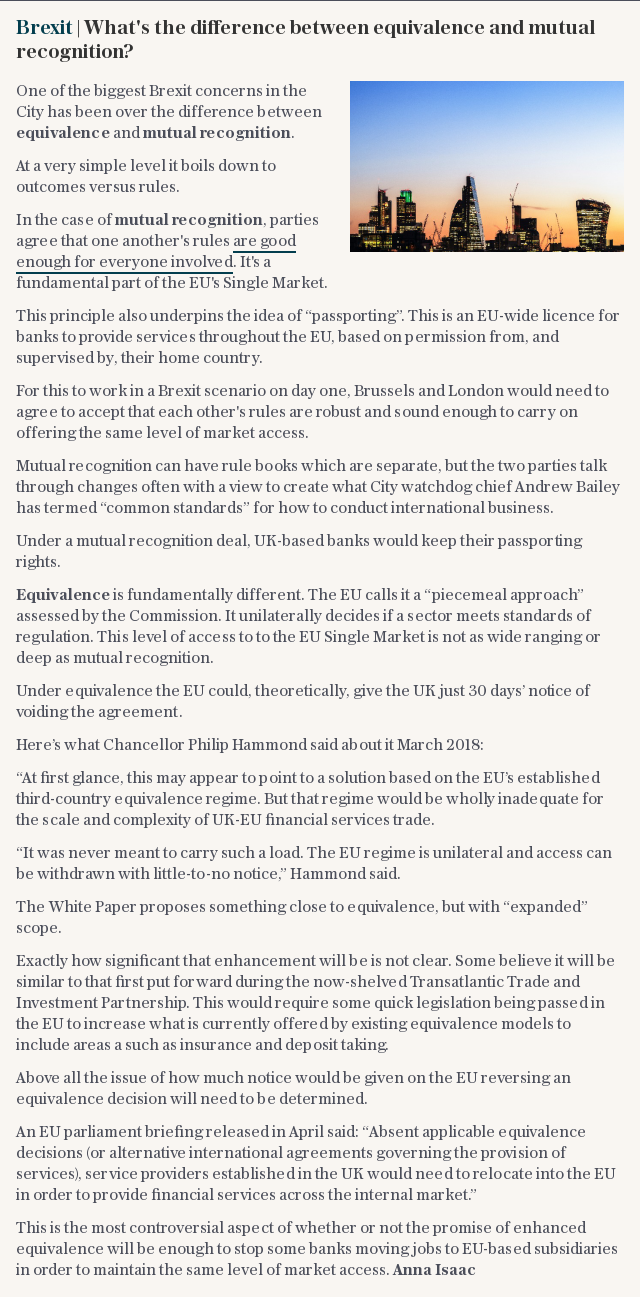JP Morgan in ‘full execution mode’ over Brexit as banks begin moving jobs

US banking giant JP Morgan is in “full execution mode” preparing for Brexit, as banks press ahead with moving staff from the UK to the EU.
Mark Garvin, vice chair of JP Morgan’s investment bank, told MPs on the Treasury select committee that up to 4,000 of the bank’s 16,000 staff in Britain could ultimately relocate to the Continent.
He said initial moves to prepare for the UK’s departure date of next March would be more modest, in the “hundreds” of staff.
But he added: “We are now in full execution mode, we are in the very advanced stages of execution in fact... In many cases we’ve passed the point of no return.”
JP Morgan chief executive Jamie Dimon had previously warned that up to 4,000 UK staff could be relocated over the long term.
Mr Garvin said the total would depend on the type of deal agreed between the two sides.

Bosses from rival lenders Citi and Barclays also said they were starting to move staff and were preparing for what they considered to be a “worst-case scenario” of a ‘no deal’ exit.
Citi said it would move 150 to 200 staff, while Barclays is relocating around 150 employees, with most going to Ireland.
However both banks played down the prospect of further significant moves. All three said London would remain their respective European headquarters.
The trio urged the Government to step up its efforts to avoid a disorderly Brexit, insisting a no deal withdrawal would be damaging for the UK and the EU.
“This is not London loses, EU wins,” said James Bardrick, UK boss of Citi.
The bosses warned a chaotic exit could lead to turmoil in the multi-trillion pound European derivatives market unless contract continuity is ensured by both sides, echoing concerns repeatedly raised by Bank of England governor Mark Carney.

They also expressed disappointment that the Government had dropped its demand for a bespoke financial services trade agreement, instead opting for an “enhanced” form of the EU’s existing equivalence regime.
“Equivalence has many holes and weaknesses, whether it’s the scope of the system, or the fact that it can be withdrawn at 30 days' notice,” said Kevin Wall, chief executive of Barclays Ireland.
“Enhanced equivalence, for it to be of value for financial services, would have to be as close to passporting as possible,” Mr Wall said, referring to the current system that allows banks to sell services easily across borders.

Citi’s Mr Bardrick said Brexit threw up “enormous uncertainty” for banks. But all three agreed that City firms could weather any disruption.
“We’ve been through far more tumult than this,” said JP Morgan’s Mr Garvin. “This is an event we can very well manage.
“Staff know that they live in a changing organisation. Compared to what is happening as a result of digitisation and other types of disruption this is not a massive challenge.”

 Yahoo Finance
Yahoo Finance 